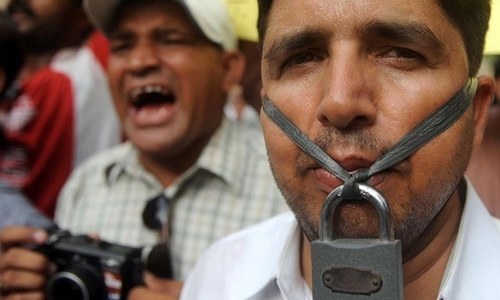KARACHI: Amid the charged political environment, representatives of different civil society organisations held a consultation to reflect on the challenges ahead of general elections, and shared concerns about the shrinking space for freedom of expression in the country.
Held at the office of the Human Rights Commission of Pakistan (HRCP), Pakistan Institute of Labour Education and Research (PILER) director Karamat Ali said that alongside “increasing interference in the electoral process which is anti-democratic, onslaught on the independent press is also a matter of grave concern. These attacks and this kind of interference we have never witnessed before on such a large scale in the political history of the country.”
Onslaught on independent press criticised
He spoke about how different media houses and television anchors were being targeted and an environment of self-censorship was being imposed; political engineering by some state institutions to give benefit to a particular political party, he explained, had become a serious issue. He labelled these as attacks against freedom of expression.
“If this situation does not change, smooth elections do not seem likely, with an overwhelming presence and interference of undemocratic elements in the elections. This will have very negative long-term implications for the country.”
Other participants of the meeting appealed to the people to cast their vote to those candidates who are talking about their fundamental rights.
Asad Butt representing the HRCP spoke about the complaints received by candidates, and their polling agents who claim to have been pressured to withdraw from the election process otherwise face dire consequences.
Similarly, he added, complaints were received from media outlets that they are sent ‘media advisories’ to promote a particular political narrative.
Censorship was done openly during Ziaul Haq and Ayub Khan’s era, he said. The civil society and media outlets were targeted then too. But what was different was that suppression was done openly and everybody knew about what was going on. Spaces were even left blank in newspapers which were an indication of censorship. However, the situation today is different as most of what is being done is done covertly, he explained.
Nasir Mansoor of National Trade Union Federation said that the country was in a dire situation as regardless of how the elections proceeded and which side won, the time after will be uncertain and can develop into a crisis.
“There is chaos and anarchy in this country and this will continue even after the election. However, the silver lining from this situation is that there is clarity among the masses about what kind of political engineering is ongoing in the country.”
The meeting resolved to continue the struggle for the provision of all fundamental rights to citizens and pledged to hold a bigger meeting comprising Karachi’s civil society to further discuss the challenges and current problems.
Published in Dawn, July 21st, 2018














































